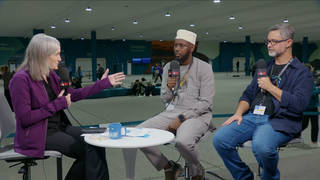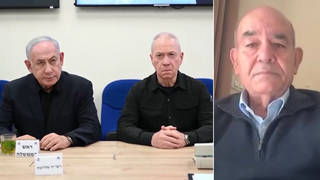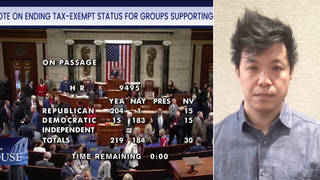And President-elect Barack Obama has reportedly offered the job of surgeon general to Dr. Sanjay Gupta, CNN’s chief medical correspondent. In addition to his work at CNN, Gupta is a practicing neurosurgeon and professor at Emory University School of Medicine in Atlanta, Emory University Hospital and Grady Memorial Hospital. During the late 1990s he served as an adviser to First Lady Hillary Clinton. In 2007, Dr. Sanjay Gupta made headlines when he accused Michael Moore of fudging facts in his film Sicko. Gupta and Moore debated each other on Larry King Live.
Michael Moore:… Eighteen thousand people die every year for no other reason other than the fact that they don’t have insurance. Medical bills are now the number one cause of bankruptcy in this country.
And if I —- if I could, I would just like to say one thing about these wait times in Canada. They always talk about how you’ve got to wait longer in Canada, which is true for some things that are not emergencies.
But the reason why you have a little bit longer wait in Canada is because everybody is in line, because they cover everybody.
In our country, we’ve removed 47 million people from the line. And any time you remove 47 million people from a line, you’re going to have less wait in line. Those of us who have insurance have a less wait time because 47 million of our citizens aren’t there in front of us in line. That’s the -—
Larry King:Good point.
Michael Moore:That’s wrong and it’s immoral.
Larry King:Sanjay, good point?
Sanjay Gupta:I think it’s worth bringing up the numbers. I think Michael is right. I think, you know, for a cardiac catheterization, for example, Michael, which is something you and I both might need one day in our lives, you wait six days if it’s sort of an emergency in Canada, and up to 60 days for it to be elective.
I don’t know what you think about those numbers. In the United States, on average — and I understand the un-insurance problem. I get it. I hear what you’re saying.
But it can take about a day for someone whose non-emergent and a few hours for someone who is emergent.
These are the facts. These are the numbers, Michael. I mean if you have a heart problem, where would you rather be?
If you were having chest pain right now and you needed a heart catheterization, would you want to be waiting six days, up to 60 days? Or do you want to be taken care of within hours or a day?










